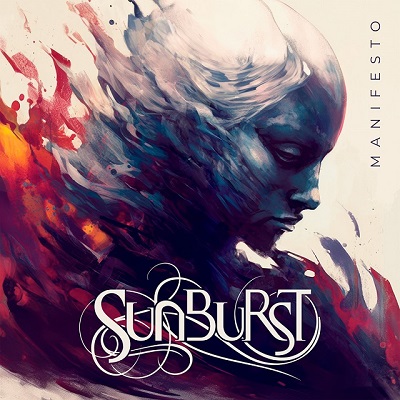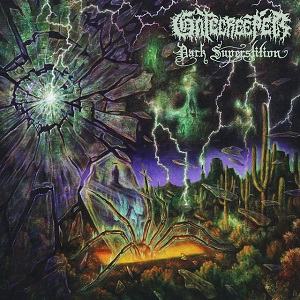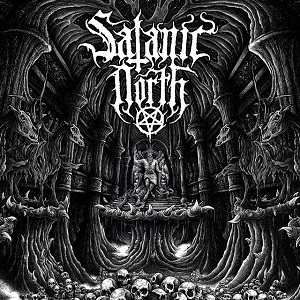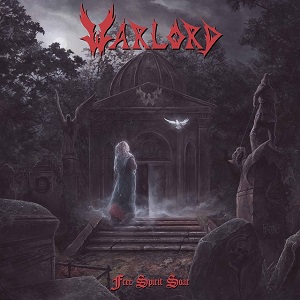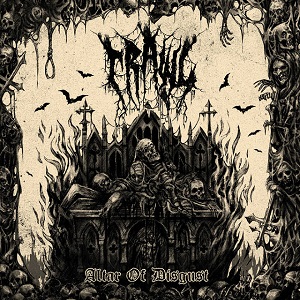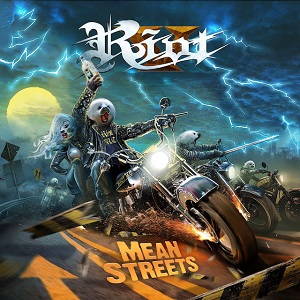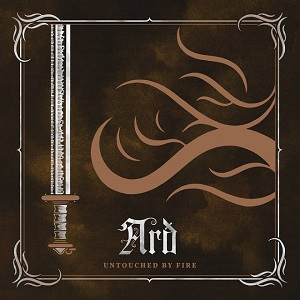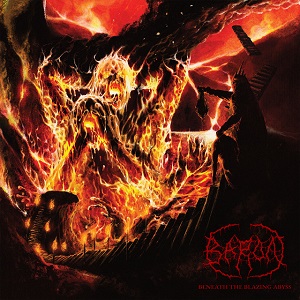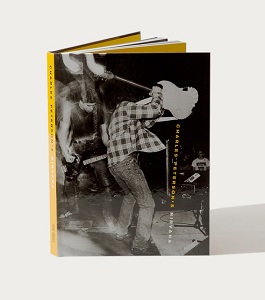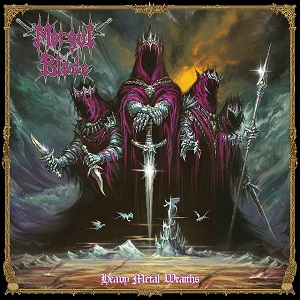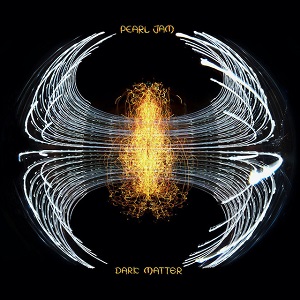TOM G. WARRIOR – “I’m Not Going To Comment On How Influential A Band Of Mine Or My Songwriting Was – This Would Be Utterly Preposterous”
October 31, 2023, 7 months ago
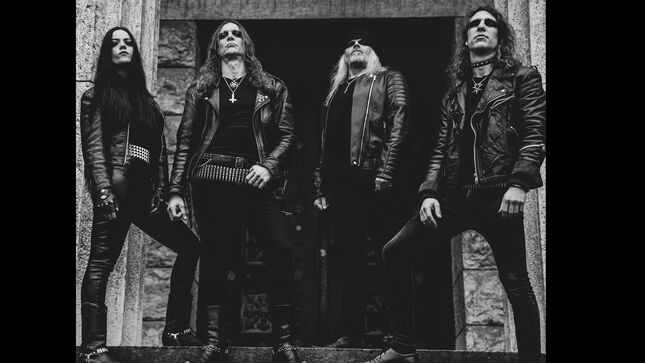
One of the most influential-yet-obscure metal bands of all-time – both musically and visually – would have to be Hellhammer. A major groundbreaker for the style that would widely become known as black metal, the Swiss band – whose best-known line-up consisted of Tom G. Warrior on vocals/guitar, Martin Eric Ain on bass, and Bruce Day on drums – issued only three demos and an EP during their two-year reign (1982-1984). But thanks to tape trading and the popularity of Warrior and Ain’s next band, Celtic Frost, Hellhammer soon became legendary in the metal underground.
Although hard to believe, Hellhammer never performed on stage during their first go-round. And with Ain having passed away in 2017, the possibility of a full-on Hellhammer reunion was extinguished. But in 2019, Warrior decided to pay tribute to Hellhammer with the formation of Triumph of Death (which sees the leader joined by guitarist André Mathieu, bassist Jamie Lee Cussigh, and drummer Tim Iso Wey), live shows, and the recently-released live album, Resurrection of the Flesh: Triumph of Death Live, 2023, which is comprised solely of Hellhammer material.
Warrior spoke to BraveWords correspondent Greg Prato about the live album, Hellhammer’s influence, and also, modern-day metal.
BraveWords: Let’s discuss the new live album, Resurrection Of The Flesh.
Tom G. Warrior: “It’s all Hellhammer songs – that Hellhammer never performed on stage. And there’s a song that a lot of people think is a Celtic Frost song, ‘Visions of Mortality,’ but it’s actually the final Hellhammer song ever written – by Martin Eric Ain and me – which we only got to record for Morbid Tales, the first Celtic Frost album. It was very obvious once I decided to form this tribute band that we would record some of the concerts – just to have a record of what we were doing, after all the work we put in. We recorded several concerts over the past few years, and once we heard the recordings and that it was really possible to capture the energy between the audience and the band, it was clear that we would release some of the best material.”
BraveWords: What has the audience’s reaction been to experiencing Hellhammer material live?
Tom G. Warrior: “I didn’t know what to expect when I formed this band. I think I simply wanted to have a go at playing this music before I die. But I really didn’t know what to expect. And I also didn’t know what the composition of the audience would be. But I have to say – touch wood – that so far, the reactions have been absolutely phenomenal. There are sometimes concerts where we have to stop repeatedly – because the audience is so agitated and erupts in chants and everything. It’s absolutely overwhelmingly fantastic. And also, the composition of the audience ranges from very young fans to people my generation. So, so far so good. It’s been a real honor to bring this on stage and encounter such a reaction.”
BraveWords: Which Hellhammer tunes do you enjoy performing live the most?
Tom G. Warrior: “I would say my personal favorites are the first song that’s on the album, ‘The Third of the Storms,’ and also ‘Messiah.’ Those are my favorites by far.”
BraveWords: Were there any songs that you may have gained a new appreciation of from performing them live?
Tom G. Warrior: “Not really. I was very much in touch with these songs for a long time. There’s nothing surprising about them for me. Not only that I wrote them years ago, but at various points in my career we revisited them. Even in my industrial project, Apollyon Sun, in the late ‘90s – we did a Hellhammer cover version. So, there really wasn’t anything astonishingly new. Also, Triumph of Death approaches this very respectfully, very truthfully. We really play the songs as close as possible to how Hellhammer used to play them in the rehearsal. So, there’s really nothing new. The surprise comes rather from the fact that 40 years on, we can go on stage with these songs – that were once ridiculed and not taken serious – all over the globe, and have such amazing reactions. That is the real surprise. And as I said, I’m deeply grateful for that.”
BraveWords: In your estimation, how influential was Hellhammer to what would eventually be known as the black metal genre?
Tom G. Warrior: “You cannot possibly ask me that. I’m not going to comment on how influential a band of mine or my songwriting was – this would be utterly preposterous. People tell me such things all the time, and it’s difficult for me to grasp this, because my career was far from easy – there were a lot of ups and downs. And especially the beginning of Hellhammer was a struggle – both as aspiring musicians and also all of us in our private lives at the time. Hence, the extremity of Hellhammer – we carried a lot of anger and frustration and pain from our private lives at the time into the band and released it there. So, it was such a personal underground thing that I never looked at it as a global thing – and much less am able to really grasp what people bestow upon me as far as titles are concerned. It’s really up to you – journalists – to access the importance or non-importance of Hellhammer. I cannot comment on that.”

BraveWords: Who were some of Hellhammer’s early influences?
Tom G. Warrior: “Of course, there is the big obvious one – which is 1970’s Black Sabbath. Which at that time, was still a fairly recent band – given that Hellhammer was formed in May ‘82. And then of course the emerging New Wave of British Heavy Metal, which completely revolutionized heavy metal and our scene – taking what had become rather dinosaur-ish 1970’s hard rock, and made it much more extreme. It took some of the lessons from punk bands, and applied it to metal. And this was a very necessary rejuvenation of our scene, and that hugely influenced us. Bands such as early Tygers of Pan Tang, or Aragorn and Angel Witch were immense influences. And then when we discovered the first Venom single, that was a moment just like discovering Discharge – then we knew we weren’t the only ones with these feelings. And we knew, ‘OK. This extreme music can be played and can be recorded. It’s not an isolated thing. We’re not insane. This really exists. Other people feel like that too, other people play this music too.’ This was a huge confirmation for us.”
BraveWords: How important was tape trading at the time?
Tom G. Warrior: “It was very important. I was very much a tape trader – I actually am still in contact with some of the people I met at the time. Tape trading was basically the YouTube or the Instagram of the time. That’s how you found out about bands that you had never heard about. And these tape trading lists where everybody with a typewriter would write down the demos they offered, would also include a brief description of the music. So it would say ‘heavy’ or ‘melodic.’ They could really go by the description to select the most extreme bands that were on the lists, and ask for these demos. And every time it was a revelation.”
BraveWords: What are your thoughts on modern-day metal?
Tom G. Warrior: “I like mostly bands that are true to spirit of metal – in as far as preserving some of the anarchy and the untamed attitude that metal originally had. Meaning that even though I accept it as a stylistic tool, I personally am a bit skeptical of bands that edit their albums too much – to the point where they’re perfect and completely impressive in their perfection, but they lack a soul or life. To me, originally heavy metal was attracted to me because people smacked the shit out of their fucking equipment on stage and weren’t afraid of mistakes. There was musical anarchy in heavy metal – and that’s what attracted me. Of course, I’m from a generation that now seems very old, and I completely understand that there is now a different mindset – which is OK. But for me as an old school heavy metaller, I think it’s important that if you call yourself ‘heavy metal,’ part of you should be true to the heart and spirit of that music – meaning more lively, more aggression and less perfection. So, I sometimes listen to new bands that emulate the old bands. For example, Messa from Italy is a band I really admire, but even though it’s a current band you can’t say they really play current music – they just make their own version of old school metal. So, it’s a bit of a mixed bag for me.”

